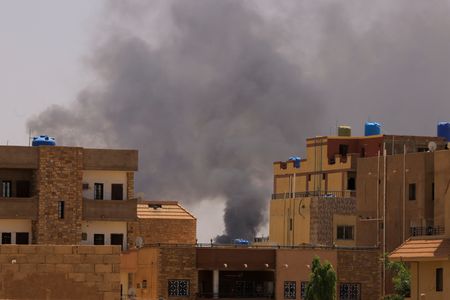By Daphne Psaledakis and Phil Stewart
WASHINGTON (Reuters) – All U.S. government personnel were evacuated from Washington’s embassy in Khartoum, as well as a small number of diplomatic personnel from other countries, U.S. officials said on Saturday, as fighting rocks Sudan.
The operation evacuated fewer than 100 people, the officials told reporters.
“We evacuated all of the U.S. personnel and dependents assigned to Embassy Khartoum,” said Under Secretary of State for Management John Bass.
A substantial number of local staff remain in Khartoum supporting the embassy, where Washington decided to suspend operations on Saturday due to the security risks, Bass said.
Forces commanded by two previously allied leaders of Sudan’s ruling council began a violent power struggle last weekend. Washington on Saturday repeatedly called on the parties to extend and expand a ceasefire for the Muslim Eid al-Fitr holiday to a sustainable cessation of hostilities.
Each side has accused the other of not respecting the truce.
The evacuation operation conducted on Saturday involved just over 100 U.S. special operations forces and began at 3 p.m. (1300 GMT) when U.S. aircraft, including three MH-47 Chinook transport helicopters, took off from a U.S. base in Djibouti, stopped in Ethiopia to refuel, then flew the last three hours to Khartoum.
U.S. forces spent just an hour on the ground in Sudan before taking off again, entering and exiting Sudan without being fired upon by the warring factions on the ground, the military said.
“We did not take any small-arms fire on the way in and were able to get in and out without issue,” said Lieutenant General Douglas Sims, the director of operations at the military’s Joint Staff.
The U.S. does not anticipate the security situation in the country changing in the near term, Bass said, adding that Washington does not foresee coordinating a U.S. government evacuation of American citizens in Sudan now or in coming days.
The U.S. military is looking at options to offer Americans some assistance exiting Sudan, while stopping short of a U.S. government-led evacuation, like the one it carried out in Afghanistan in 2021.
Chris Maier, an assistant secretary of defense, said the U.S. military might use drone or satellite imagery to detect threats to Americans traveling on overland routes out of Sudan, or position naval assets at the Port of Sudan to aid Americans arriving there.
Bass said some Americans and other nationals had successfully traveled by land from Khartoum to Port Sudan, which he said appeared to be a challenging journey given the lack of fuel, food and predictably available water.
While the State Department is not recommending or advising people to take that route, he said they would be looking for ways to help them make the journey.
U.S. Assistant Secretary of State for African Affairs Molly Phee said Ethiopian Prime Minister Abiy Ahmed offered the full support of the country, which neighbors Sudan and Djibouti, for overflight and refueling capabilities in the evacuation operation.
Washington has worked to repair relations with Addis Ababa that were strained by a two-year war in the northern region of Ethiopia.
(Reporting by Daphne Psaledakis and Phil Stewart; Editing by William Mallard)






